This article has an unclear citation style.(March 2013) |
Roy Moxham (born 1939) is a British writer, the author of historical books highlighting little-known historical facts.
This article has an unclear citation style.(March 2013) |
Roy Moxham (born 1939) is a British writer, the author of historical books highlighting little-known historical facts.
Moxham was born in Evesham, Worcestershire on 13 September 1939 and went to Prince Henry's Grammar School there. In 1961 he went to Nyasaland (now Malawi) to manage a tea plantation. In 1973 he returned to Britain and established a small gallery in Covent Garden to sell African art, travelling widely in Africa. In 1978 he went to Camberwell College of Art and Crafts, where he qualified as a book and archive conservator. Subsequently, he was a conservator at Canterbury Cathedral Archives and then became Senior Conservator at the Senate House Library of the University of London, from which he retired in 2005. He lives in London[ when? ], travels widely in south and south-east Asia and is a Fellow of the Royal Geographical Society.
Moxham's first book was The Freelander, a novel based on the exploits of a group of idealists trying to establish a commune on Mount Kenya in the 1890s. His best-known book is The Great Hedge of India . This book is part-travelogue, part-historical treatise on the author's quest to find a 1500-mile long customs hedge built by the British in India to prevent smuggling of salt and sugar. His next book, Tea: Addiction, Exploitation and Empire focuses on the effect of British tea addiction on British policies in Asia and Africa, and includes the author's own experience as a tea plantation manager in Africa. An updated edition " A Brief History of Tea" came out in 2009. In 2010 he published a memoir, "Outlaw: India's Bandit Queen and Me" about his friendship with Phoolan Devi, the Indian bandit turned politician. In 2014 he published as an e-book a novel, "The East India Company Wife", based on the real life of Catherine Cooke, a thirteen-year-old English girl who went to India with her parents in 1709. In November 2016 The Theft of India: The European Conquests of India 1498 – 1765 was published.

Phoolan Devi (1963–2001), popularly known as the Bandit Queen, was a Mallah woman who grew up in poverty in a village in the Indian state of Uttar Pradesh. Her family was in a land dispute which caused many problems in her youth and after being repeatedly sexually abused and married off at the age of 11, she joined a dacoit group, later becoming a bandit leader. Her gang robbed higher caste villages and held up trains and vehicles. She became a hero of the lower castes for being a Robin Hood figure who punished her rapists and evaded capture by the authorities for several years. She surrendered in 1983 in a carefully negotiated settlement and served 11 years in Gwalior prison.
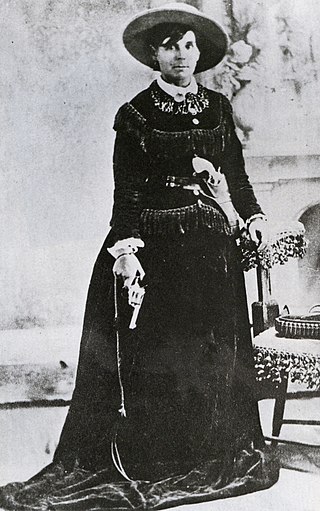
Myra Maybelle Shirley Reed Starr, better known as Belle Starr, was an American outlaw who gained national notoriety after her violent death.
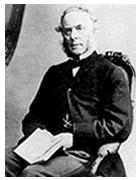
Robert Fortune was a Scottish botanist, plant hunter and traveller, best known for introducing around 250 new ornamental plants, mainly from China, but also Japan, into the gardens of Britain, Australia, and the USA. He also played a role in the development of the tea industry in India in the 19th century.
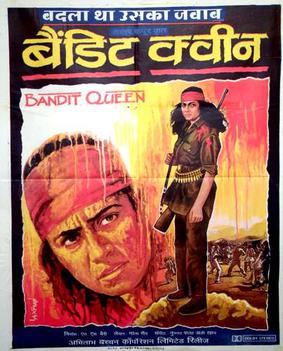
Bandit Queen is a 1994 Indian Hindi-language biographical action-adventure film based on the life of Phoolan Devi as covered in the book India's Bandit Queen: The True Story of Phoolan Devi by the Indian author Mala Sen. It was written, produced, and directed by Shekhar Kapur and starred Seema Biswas as the title character. The music was composed by Ustad Nusrat Fateh Ali Khan. The film won the National Film Award for Best Feature Film in Hindi, Filmfare Critics Award for Best Movie and Best Direction for that year. The film was premiered in the Directors' Fortnight section of the 1994 Cannes Film Festival, and was screened at the Edinburgh Film Festival. The film was selected as the Indian entry for the Best Foreign Language Film at the 67th Academy Awards, but was not accepted as a nominee.

The Plantation of Ulster was the organised colonisation (plantation) of Ulster – a province of Ireland – by people from Great Britain during the reign of King James I. Most of the settlers came from southern Scotland and northern England; their culture differed from that of the native Irish. Small privately funded plantations by wealthy landowners began in 1606, while the official plantation began in 1609. Most of the colonised land had been confiscated from the native Gaelic chiefs, several of whom had fled Ireland for mainland Europe in 1607 following the Nine Years' War against English rule. The official plantation comprised an estimated half a million acres (2,000 km2) of arable land in counties Armagh, Cavan, Fermanagh, Tyrone, Donegal, and Londonderry. Land in counties Antrim, Down, and Monaghan was privately colonised with the king's support.

Colonial India was the part of the Indian subcontinent that was occupied by European colonial powers during the Age of Discovery. European power was exerted both by conquest and trade, especially in spices. The search for the wealth and prosperity of India led to the colonisation of the Americas after Christopher Columbus went to the Americas in 1492. Only a few years later, near the end of the 15th century, Portuguese sailor Vasco da Gama became the first European to re-establish direct trade links with India since Roman times by being the first to arrive by circumnavigating Africa. Having arrived in Calicut, which by then was one of the major trading ports of the eastern world, he obtained permission to trade in the city from the Saamoothiri Rajah. The next to arrive were the Dutch, with their main base in Ceylon. Their expansion into India was halted after their defeat in the Battle of Colachel by the Kingdom of Travancore, during the Travancore–Dutch War.

The history of tea spreads across multiple cultures over the span of thousands of years. With the tea plant Camellia sinensis native to East Asia and probably originating in the borderlands of southwestern China and northern Burma. one of the earliest tea drinking is dated back to China's Shang dynasty, in which tea was consumed as a medicinal drink. An early credible record of tea drinking dates to the 3rd century AD, in a medical text written by Chinese physician Hua Tuo. It first became known to the western world through Portuguese priests and merchants in China during the early 16th century. Drinking tea became popular in Britain during the 17th century. The British introduced commercial tea production to British India, in order to compete with the Chinese monopoly on tea.
A plantation economy is an economy based on agricultural mass production, usually of a few commodity crops, grown on large farms worked by laborers or slaves. The properties are called plantations. Plantation economies rely on the export of cash crops as a source of income. Prominent crops included cotton, rubber, sugar cane, tobacco, figs, rice, kapok, sisal, and species in the genus Indigofera, used to produce indigo dye.
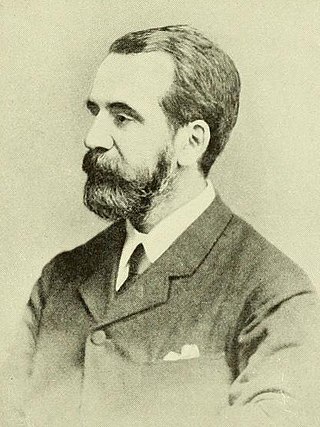
Sir George King was a British botanist who was appointed superintendent of the Royal Botanic Garden, Calcutta in 1871, and became the first Director of the Botanical Survey of India from 1890. He was recognised for his work in the cultivation of cinchona and for setting up a system for the inexpensive distribution of quinine throughout India through the postal system.
George Glas was a Scottish seaman and merchant adventurer in West Africa.

The historical phenomenon of colonization is one that stretches around the globe and across time. Ancient and medieval colonialism was practiced by the Phoenicians, the Greeks, the Turks, and the Arabs.
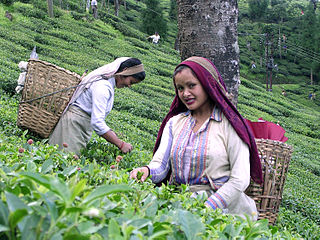
India is one of the largest tea producers in the world, although over 70 per cent of its tea is consumed within India itself. A number of renowned teas, such as Assam and Darjeeling, also grow exclusively in India. The Indian tea industry has grown to own many global tea brands and has evolved into one of the most technologically equipped tea industries in the world. Tea production, certification, exportation, and all other facets of the tea trade in India are controlled by the Tea Board of India.

Pangani Town is a historic Swahili settlement located on the south eastern shore of Tanga Region, Tanzania. The town lies 45 km (28 mi) south of the city of Tanga, at the mouth of the Pangani River. It is the headquarters of the Pangani District. Administrately the town Pangani is situated within two wards, Pangani Mashariki and Pangani Magharibi. The town is currently the largest settlement in Pangani district and is a major tourist attraction in Tanga region and is a Tanzanian National Histotic Site.

The Inland Customs Line, incorporating the Great Hedge of India, was a customs barrier built by the British colonial rulers of India to prevent smuggling of salt from coastal regions in order to avoid the substantial salt tax.
Romanticised outlaws are stock characters found in a number of fictional settings.

The Madras Forest Department, now officially, Tamil Nadu Forest Department, is a government department of Tamil Nadu. The department is responsible for managing all the protected areas and forests plus environmental and wildlife related issues of Tamil Nadu state in South India. The objective of the Tamil Nadu Forest Department is to conserve biodiversity and eco-systems of forests and wilderness areas to ensure water security and food security of the state.
The Indian Slavery Act, 1843, also known as Act V of 1843, was an act passed in British India under East India Company rule, which outlawed many economic transactions associated with slavery.

George Scot or Scott of Pitlochie, Fife was a Scottish writer on colonisation in North America.

The Indian Tea Association is a trade association of Indian tea producers. The head office is in Kolkata (Calcutta).
Arup Kumar Dutta is an Indian writer and Journalist from Guwahati, Assam. He has written 18 books for adults and 17 adventure novels for young people. In 2014 he was awarded the Life Time Achievement Honour by Association of Writers and illustrators for Children, New Delhi, the Indian chapter of the International Board of Books for Young People. He has also won numerous awards including the Shankar's Award in 1979, conferred to mark The International Year of the Child. He has been awarded the civilian award Padma Shri by Government of India in 2018.